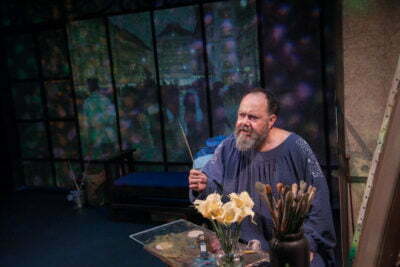The Portrait

Written and Directed by Susan Padveen
Performed by Cameron Pfiffner
Produced by The Greenhouse Theater Center
Creative Genius Has No Sense of Boundaries
A common complaint about one-person shows is that the speaker tends to be poorly motivated to monologue to the audience for over an hour. Susan Padveen’s The Portrait, about Austrian Art Nouveau painter Gustav Klimt, suffers from the opposite problem. Klimt, played by Cameron Pfiffner, and, on off-nights, by Matt Maxwell, is attempting to get the model for his latest commissioned work to take her clothes off. He’s known as a believer in free love, and is certain that the young bride-to-be, represented by the audience, would not have come to his studio if she were not turned on by his reputation and attention. She, however, is not so easily manipulated, and so we are treated to Klimt’s rambling attempts to seduce her while he makes sketches during his long preparation process.
 I think it’s clear that I didn’t like Klimt’s character as much as I was meant to. Pfiffner’s performance is nothing short of convincing, and at one point, he even does an acceptable job singing an opera aria. Of course, the aria in question is the lecherous Duke of Mantua’s “Questa o quella” (This one or that one) from Rigoletto, and though Klimt assures us that it doesn’t really represent the way he thinks about women, everything he says and does implies otherwise. Within minutes of the play’s beginning he is “joking” that he will stay on his side of the room, so that the young woman feels safe from him, and he from her temptations. He then cheekily spends the following hour pointing out when he is drawing closer and becoming aroused. Klimt explains that his depictions of the female form have caused him to be seen as a degenerate by conservative Viennese society, but that his belief in sexual liberation is based on mutual understanding and comfort. Interspersed between his babbling are excerpts from a letter he wrote to his ex-long-term partner when she finally realized that he actually meant what he said about not being monogamous and left him. Klimt tearfully begs her to return, but defiantly proclaims that he will never change.
I think it’s clear that I didn’t like Klimt’s character as much as I was meant to. Pfiffner’s performance is nothing short of convincing, and at one point, he even does an acceptable job singing an opera aria. Of course, the aria in question is the lecherous Duke of Mantua’s “Questa o quella” (This one or that one) from Rigoletto, and though Klimt assures us that it doesn’t really represent the way he thinks about women, everything he says and does implies otherwise. Within minutes of the play’s beginning he is “joking” that he will stay on his side of the room, so that the young woman feels safe from him, and he from her temptations. He then cheekily spends the following hour pointing out when he is drawing closer and becoming aroused. Klimt explains that his depictions of the female form have caused him to be seen as a degenerate by conservative Viennese society, but that his belief in sexual liberation is based on mutual understanding and comfort. Interspersed between his babbling are excerpts from a letter he wrote to his ex-long-term partner when she finally realized that he actually meant what he said about not being monogamous and left him. Klimt tearfully begs her to return, but defiantly proclaims that he will never change.
 Since visuals are such an important part of a show about a painter, Padveen has assembled a very talented design team. Set designer Jacqueline Penrod and props designer Devon Green have filled the stage with Klimt’s run-down, cat-filled studio, Alaina Moore has decked him out in a comfy robe, and Benjamin White’s projections showcase Klimt’s actual works. Klimt’s paintings, besides often featuring nude women, included copious amounts of gold leaf and geometric patterns. They are quite amazing, and justify, in part, why somebody would commission Klimt for a portrait and why the audience should want to learn about him. However, to be the wall against which he bounces his voice is exactly like being the object of undesired attention from a person who will not take a hint or acknowledge a firm refusal in real life: boring and stressful. There is something interesting in Klimt’s lifestory, but the script needs to be more dynamic, for the sake of structure as well as so the main character doesn’t spend the entire play antagonizing the audience.
Since visuals are such an important part of a show about a painter, Padveen has assembled a very talented design team. Set designer Jacqueline Penrod and props designer Devon Green have filled the stage with Klimt’s run-down, cat-filled studio, Alaina Moore has decked him out in a comfy robe, and Benjamin White’s projections showcase Klimt’s actual works. Klimt’s paintings, besides often featuring nude women, included copious amounts of gold leaf and geometric patterns. They are quite amazing, and justify, in part, why somebody would commission Klimt for a portrait and why the audience should want to learn about him. However, to be the wall against which he bounces his voice is exactly like being the object of undesired attention from a person who will not take a hint or acknowledge a firm refusal in real life: boring and stressful. There is something interesting in Klimt’s lifestory, but the script needs to be more dynamic, for the sake of structure as well as so the main character doesn’t spend the entire play antagonizing the audience.
Somewhat Recommended
Jacob Davis
Reviewed July 22, 2016
For more information, see The Portrait’s page on Theatre in Chicago.
Playing at the Greenhouse Theater Center, 2257 N Lincoln Ave, Chicago. Tickets are $34-48; to order, call 773-404-7336 or visit greenhousetheater.org. Performances are Wednesdays-Saturdays at 8:00 pm and Saturdays and Sundays at 2:30 pm through August 14. Running time is eighty minutes.

